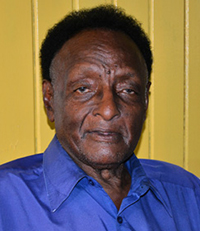Unsworn child allowed to corroborate sworn evidence
CONVICTED burglar & rapist Boodram Lall who in 1967 was found guilty on the unsworn evidence of a child that corroborated sworn testimony of the mother, appealed and was freed by the Guyana Court of Appeal.
That court constituted by Chancellor Kenneth Stoby and Justices of Appeal P. A. Cummings and Victor Crane, found that the trial judge had erroneously told the jury at the trial that the child’s unsworn testimony was capable of corroborating the mother’s evidence.
As a result, the appeal was allowed and the convictions and sentences were quashed.
The facts of the case disclosed that the appellant was indicted on two counts, firstly, for ‘burglary with intent to commit rape’ on `K’. , the mother of `K.R.’ , a nine year old girl.
The trial judge questioned the child and recorded the opinion that she was of sufficient competent understanding to give evidence but he did not permit her to be sworn as he did not think she understood the nature of an oath and, as a result she gave unsworn evidence. Her testimony, if admissible and if believed, afforded strong corroboration of her mother’s evidence.
The jury were directed that the rule of practice was to look for corroboration of the mother’s evidence. Quite properly, he told them that they could convict on the uncorroborated evidenced of the mother but he also told them, over and over again, that ` K. R.’s’ unsworn evidence corroborated the mother’s testimony.
That court held (i) the unsworn evidence of a child could not be used to corroborate the sworn testimony of another person; (ii) the directions were of such a nature that it was impossible to say whether the jury relied for their verdict of “Guilty” on the uncorroborated evidence of the mother alone coupled with the warning that they were entitled to do, or, on the evidence of the child as corroborative of the mother’s testimony.
That court which allowed the appeal – quashing the convictions and sentences – had made reference to nine cases.
Queen’s Counsel Mr. J. O. F. Haynes had represented the appellant while Mr. N.A. Graham, Senior Crown Counsel appeared for the respondent.
Delivering the judgment of the Court, Chancellor Stoby said that the Jury trial took place in April,1967 at the Demerara Assizes.
After a trial which lasted two days the accused was convicted on both counts and sentenced to concurrent terms of imprisonment of seven years.
According to him, at the trial, a nine-year-old-girl, K.R. was called by the Crown, as a witness.
The judge questioned the child and at the conclusion of the questioning, he recorded that in his opinion she was of sufficient competent understanding to give evidence. The judge did not permit her to be sworn as he did not think she understood the nature of the oath, and in the result she gave unsworn evidence. Her evidence if admissible, and if believed, afforded strong corroboration of her mother’s evidence.
The main ground of appeal, said the Chancellor, is whether the trial judge was correct in directing the jury that the unsworn evidence of a child could corroborate sworn evidence.
The Chancellor explained, “The manner in which the law developed to permit the unsworn testimony of witnesses is not without interest. In early times all evidence had to be given on oath and on the Gospel; no one but a Christian could testify.
Competency to testify depended upon acceptance of the witness’ belief in the Gospel . Non-Christians and children of tender years were deemed to be ignorant of the nature and obligations of an oath, they were not allowed to be sworn and so could not testify; Such was the state of the law until the celebrated case of Omychand v. Barker, (1744) 1 Atk 22 in which the depositions of Indian witnesses of the Gentoo religion taken by Order of Court, according to the local ceremonies on commissions in the East Indies were admitted and read in evidence after being objected to.
In the report of this case at Page 29, LORD CHIEF JUSTICE LEE remarked that it was determined at the Old Bailey upon mature consideration, that a child should not be admitted to give evidence without oath; and LORD CHIEF BARON PARKER in the same case said that it was so ruled at Kingston Assizes before LORD RAYMOND, where, upon an indictment for rape, he refused the evidence of a child without oath .
The old cases of R. v. Powell (1775) 1 Leach 110 and R. v. Braster, (1779) 1 Leach 199, both emphasize the fact that though there was no precise or fixed rule as to the time within which infants are excluded from giving evidence, the testimony of an infant was not receivable under any circumstance except under oath.
After reviewing a number of cases, and perusing the directions of the trial judge, the Chancellor declared, “It is impossible for us to say which of these two alternative situations the jury accepted – whether they relied for their verdict of “Guilty” on the uncorroborated evidence alone coupled with the warning as they were entitled to do, or on the evidence of the child as corroborative of the mother’s.
Indeed, the jury having been told that it would be dangerous for them to act on the uncorroborative evidence of `K.’ alone may very well, it is contemplated, have heeded the judge’s warning and convicted with the help of the evidence of the child which was repeatedly suggested to them as being capable of corroborating the mother’s.
“It seems to us that the likelihood of a verdict of “Guilty” returned in such circumstances without the proviso (14) being explained to them is unsafe, and founded as it is on a non-direction which amounted to a misdirection in law ought to be set aside in the interests of justice.
“The appeal is allowed and convictions and sentences quashed”.
Justices of Appeal Cummings and Crane concurred.




.jpg)











